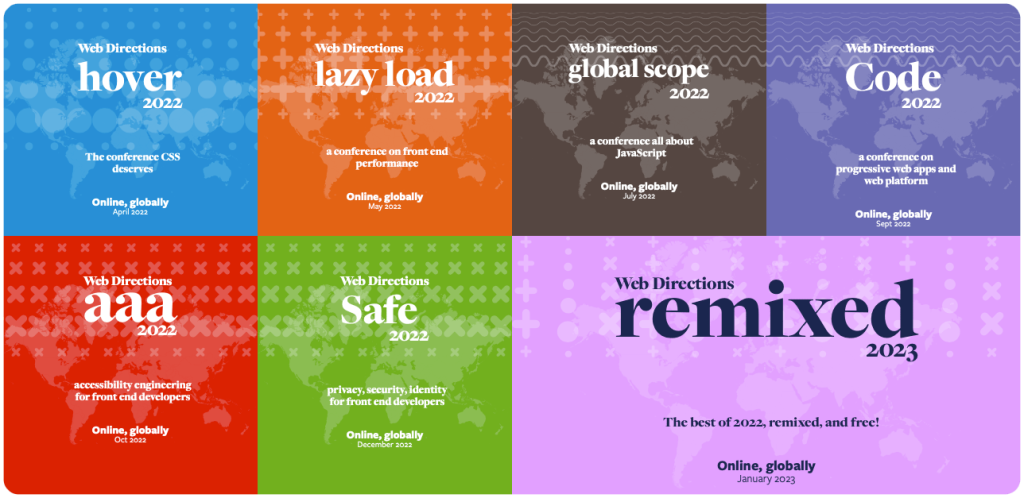Global Accessibility Awareness Day
May 20 has, over the last decade, become Global Accessibility Awareness Day, a day “to get everyone talking, thinking and learning about digital access/inclusion and people with different disabilities”.
The last few weeks I’ve been providing a bit of assistance, and some of the technology we developed for our online conferences to a new event AITPAC (Accessible & Inclusive Tourism Conference in the Asia-Pacific). Not the catchiest name, but it’s been an eye opening experience.
Travellers with disabilities, tourism operators who focus on accessible travel, and policy makers have all shared stories of their experiences, and the lessons they’ve learned delivering more accessible and inclusive travel. These are significant challenges, often requiring considerable investment in technology, and infrastructure.
Meanwhile, since its inception accessibility has always been considered important, indeed central, to the Web (it’s right there in the name, the World Wide bit), yet many accessibility experts and advocates lament that the accessibility of web sites and apps has only diminished in recent years.
As mentioned in a recent newsletter, organisations continue to bring legal actions against the US Federal Government to avoid the obligations mandated by the Americans with Disabilities Act to provide accessible web sites (and mobile apps), and earlier this year a Federal Court (though not the Supreme Court) held that here is no obligation provide accessible web sites since using a strict interpretation of the Act
[a] website is not a place of public accommodation, and…the website did not prevent access to the goods, services, privileges, or advantages of Winn-Dixie’s physical locations
Essential Accessibility
Whether this decision will be overturned on appeal, or similar cases decided differently in other Federal Courts remains to be seen, but it emphasises the long hard fought battle for equality and fairness when it comes to disability is far from over.
When we ran our very first conference in 2004, accessibility (awareness raising, testing, techniques and technologies) were a very significant part of the program. Right around that time Jeff Veen, a towering figure in web design published “I don’t care about accessibility” (of course he did care…) which finished with a statement those of us who focussed on a standard based web all agreed with–
And that’s why I don’t care about accessibility. Because when Web design is practiced as a craft, and not a consolation, accessibility comes for free.
Jeff Veen: I don’t care about accessibility
But we were wrong.
The rise of a JavaScript framework driven web, which increasingly divorces the developer from the underlying markup (and associated CSS) put a huge dent in those beliefs, showing them to be naive.
So nearly two decades later often a button is not a button but (at best) a div with ARIA attributes, that poorly emulates a button, as Ian Lloyd dissects in Enough with the role-play—let’s get back to the basics. Yes, what we build has become more complex, and the challenges in making our web content accessible have increased, but our efforts, it feels, have across the board diminished.
How much effort we put into ensuring sites work in older browsers like Internet Explorer? Safari desktop has a market share of less than 4%, yet if a site wasn’t usable, or significantly diminished in Safari, how quickly would that be spotted and fixed?
And yet people with disabilities represent a significantly higher percentage of the population than users of Internet Explorer or Safari.
When I see the extraordinary efforts–in constructing and fitting out rooms, indeed whole buildings, retrofitting vehicles, changing processes and procedures–that individuals and organisations go to to provide accessible and inclusive travel, and think about the relatively straightforward, well understood technologies and practices, the great tools we have to help us identify accessibility shortcomings in our code, I’m feel a bit ashamed to be honest.
And I am guilty of it as well. I take for granted that my work is accessible, but recently doing a proper audit for the first time in a long time, realised there was a glaring accessibility issue with the table we use to present pricing and benefits for our conferences, one that took a few minutes to address. It was chastening.
We all really do need to do better. To make accessibility testing as important as any other testing of our sites. To understand better the different ways in which our content might be excluding users (not just the vision impaired, but the Deaf, people with vestibular disorders, movement disorders, and others). It’s not all about code of course, content and visual design play a significant part. But as developers, I feel, we have a particular opportunity and responsibility.
Announcing Access All Areas
On this 10th annual Global Accessibility Awareness Day, I want to announce something that will hopefully assist developers do this better. It’s a new conference I’ve had in mind for a long time, focussed on Accessibility Engineering, Access All Areas (or AAA). There are a lot of great accessibility focussed conferences, but they typically cater to accessibility experts.
We’ve designed AAA for front end developers. It’s not about advocating for the importance of accessibility, it’s about delivering it as developers –understanding the kinds of accessibility issues our code might create, the tools for assessing these, and the technologies and techniques for addressing them.
Just as performance, and security are key responsibilities for developers, so too is accessibility, and AAA will help developers do that part of their job better.
We haven’t an exact date just yet, but it will be later in 2021, most likely in the October/November time frame.
Calls for presentations are open now, if you’d like to share techniques, insights into technologies, and practices you think would help other developers improve the accessibility of their work, we’d love to hear from you.
In 2022 we have a whole series of events for Front End Developers
Across 2022 Web Directions is presenting our series of online conferences for front end designers and developers. Focussed deep dives, they go far beyond what you might expect from conference programs.
Priced individually from $195, or attend all 6, plus get access to our conference presentation platform Conffab for just $595, or $59 a month.
Great reading, every weekend.
We round up the best writing about the web and send it your way each Friday.

